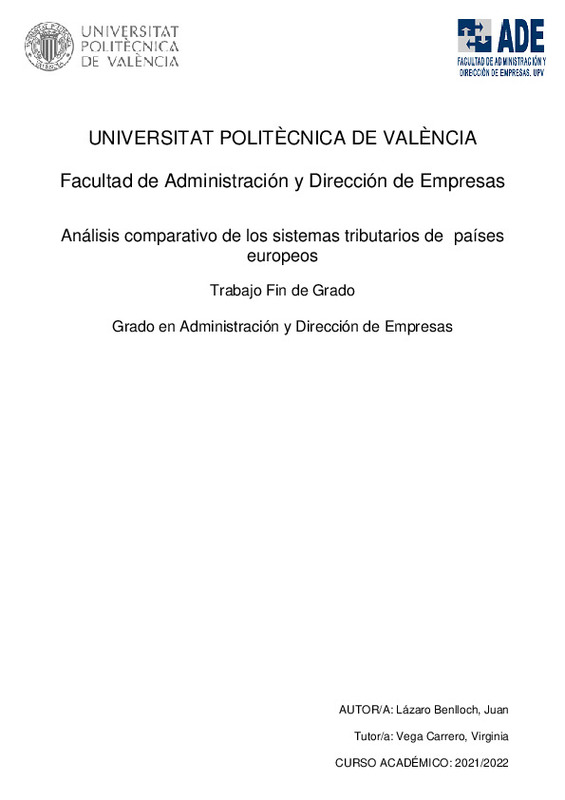|
Resumen:
|
[ES] Los impuestos se definen como una obligación de pago, que el Estado impone tanto a las
personas físicas como a las jurídicas, con el fin de financiar las actividades del sector
público que son del provecho común. ...[+]
[ES] Los impuestos se definen como una obligación de pago, que el Estado impone tanto a las
personas físicas como a las jurídicas, con el fin de financiar las actividades del sector
público que son del provecho común. Existen muchos tipos de impuestos, como pueden
ser el IVA, el IRPF, el ISR y otros tantos que ayudan a cubrir las necesidades públicas
del país. Este trabajo se centrará en los impuestos que afectan al sector privado,
analizando de qué manera repercuten en el funcionamiento de las empresas Además de
centrarse en el sector privado en España, realizaremos un análisis profundo de cuatro de
las potencias europeas, Francia, Reino Unido, Alemania y la propia España, que
anteriormente se ha mencionado, con el fin de analizar el sistema fiscal por el que se
rigen. En primer lugar, se hará una breve introducción del sistema fiscal que sigue cada
país, y cuáles son los impuestos que afectan al sector privado en cada uno de ellos.
Posteriormente, se verá cómo ha ido evolucionando el sistema fiscal en cada uno de los
cuatro países, para ver así en qué aspectos esta evolución ha sido más beneficiosa para el
sector privado, y en qué aspectos dicho sector se ha visto perjudicado. Además, se
realizará una comparativa entre los cuatro países, con el fin de conocer en profundidad
qué ventajas presenta cada país respecto al resto. Para ello, se identificarán los aspectos
a tener en cuenta a la hora de examinar esta clase de tributos. Esta identificación será
llevada a cabo mediante la obtención de estadísticas extraídas de los estudios que resulten
más relevantes, con el fin de realizar la comparativa lo más detallada y profunda posible.
Otro de los puntos que se analizará a lo largo del trabajo será la presencia de los paraísos
fiscales, y cómo algunas empresas, optan por recurrir a éstos con la intención de evitar
estos gastos. Estos paraísos fiscales tienen efectos sobre el conjunto de la sociedad puesto
que se dejan de recibir ingresos por parte del Estado para servicios públicos. Es una
práctica que se encuentra perseguida por los sistemas tributarios de cada país, ya que
permite a las empresas pagar impuestos con poca o ninguna carga tributaria, en un entorno
estable política y económicamente. A lo largo de la investigación, se profundizará y se
estudiarán los conceptos de evasión y elusión, ya que a priori pueden resultar dos
conceptos muy similares, pero legalmente hablando, su significado difiere en gran
medida. Por último, se expondrán casos reales de grandes empresas que han utilizado
paraísos fiscales con el fin de reducir sus impuestos y se verá el procedimiento que han
llevado a cabo para emplear dichas prácticas.
[-]
[EN] Taxes are defined as an obligation to pay, which the State imposes both on
individuals and legal entities, in order to finance the activities of the sector
public that are of common benefit. There are many types of ...[+]
[EN] Taxes are defined as an obligation to pay, which the State imposes both on
individuals and legal entities, in order to finance the activities of the sector
public that are of common benefit. There are many types of taxes, such as
be VAT, personal income tax, income tax and many others that help cover public needs
from the country. This work will focus on taxes that affect the private sector,
analyzing how they affect the operation of companies In addition to
focusing on the private sector in Spain, we will carry out an in-depth analysis of four of
the European powers, France, the United Kingdom, Germany and Spain itself, which
previously mentioned, in order to analyze the tax system by which
govern. In the first place, a brief introduction will be made of the fiscal system that follows each
country, and what are the taxes that affect the private sector in each of them.
Subsequently, it will be seen how the tax system has evolved in each of the
four countries, to see in what aspects this evolution has been most beneficial for the
private sector, and in which aspects this sector has been harmed. Also I know
will make a comparison between the four countries, in order to know in depth
What advantages does each country have over the rest? For this, the aspects
to take into account when examining this kind of taxes. This ID will be
carried out by obtaining statistics extracted from the studies that result
most relevant, in order to make the most detailed and in-depth comparison possible.
Another point that will be analyzed throughout the work will be the presence of paradises
taxes, and how some companies choose to resort to them with the intention of avoiding
These expenses. These tax havens have effects on society as a whole
that they stop receiving income from the State for public services. Is a
practice that is persecuted by the tax systems of each country, since
allows companies to pay taxes with little or no tax burden, in an environment
politically and economically stable. Throughout the investigation, it will be deepened and
will study the concepts of evasion and avoidance, since a priori they can be two
very similar concepts, but legally speaking, their meaning differs greatly
measure. Finally, real cases of large companies that have used
tax havens in order to reduce their taxes and you will see the procedure they have
undertaken to employ such practices.
[-]
|







